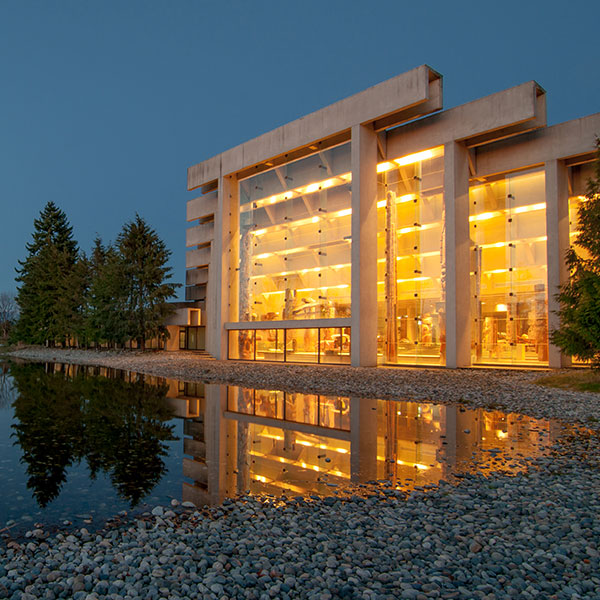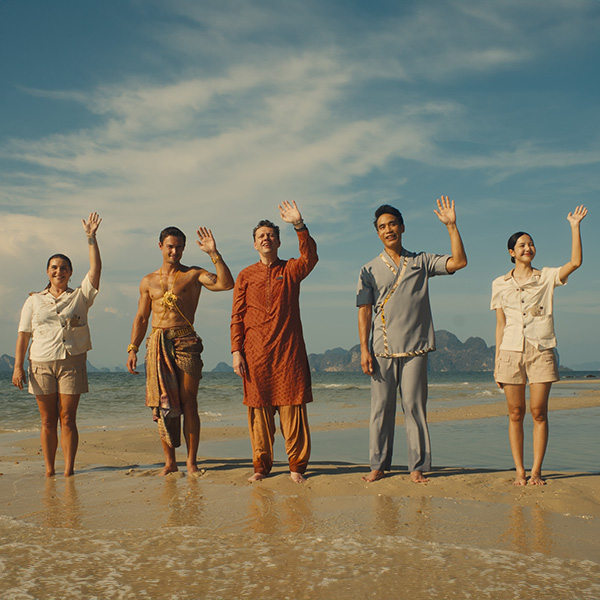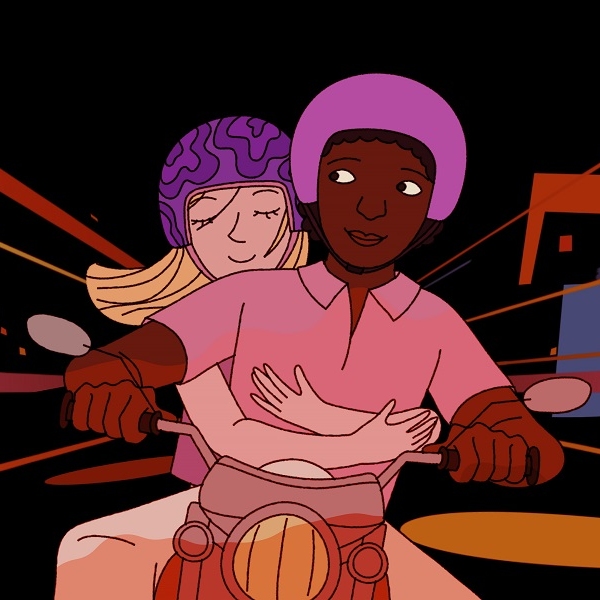On January 6, a violent attack on the United States Capitol by far-right insurrectionists sent shockwaves throughout the country and left five people dead. The number of fatalities could have been significantly higher – some of the rioters had made death threats against then-Vice-President Mike Pence, House Speaker Nancy Pelosi, and other legislators. Video footage made available after the attack showed just how dangerously close some of the rioters were to many of their targets.
“The right-wing in the United States has been infiltrated by populists, racists, and anti-Semites – many with violent fantasies about a government overthrow,” says filmmaker and journalist Daniel Lombroso, BA’15.
He ought to know – he spent four years in close quarters with some of the leading figures in white nationalist circles in the U.S. His new film White Noise focuses on three of those individuals – Richard Spencer, Mike Cernovich, and Canadian Lauren Southern.
The documentary is available in the U.S. for streaming through Amazon, Apple TV, Google Play and Vimeo On Demand. The Boston Globe described White Noise as “an expertly edited, four-year immersion into a phenomenon that has shaped the volatile politics of our time,” while The San Jose Mercury News called it “one of the most important – and scariest – documentaries of 2020.”
The film’s official Canadian premiere takes place soon. The Canadian Anti-Hate Network and the Sarah and Chaim Neuberger Holocaust Education Centre will make White Noise available for streaming from March 5 to March 7 (Lombroso will take part in a discussion related to the premiere on March 7 at 7:30 pm).
Lombroso made the film while working for The Atlantic. He recently became a senior producer at The New Yorker, where he will be making short documentaries. He spoke to the McGill News about White Noise and its subjects.
In your film, we spend a lot of time with Spencer, Cernovich and Southern at public events and in private moments. Why did they allow you so much access when they knew you weren’t sympathetic to their beliefs?
That’s a good question and it is one that I continue to ask myself.
I began covering the alt-right pretty early on in 2016 as a reporter at The Atlantic and I started with a short documentary portrait of Richard Spencer before he became so well known. The clip at the beginning of [White Noise], where there is a roomful of people who break out into Nazi salutes, that was actually from a short video I shot earlier that went viral once The Atlantic released it.
When Charlottesville happened, we knew we [should do] a feature, so I kind of doubled down on the project. I spent three or four months of initial filming, following different figures in the alt-right. I eventually identified these three as being the most influential and the ones to pay attention to.
Ultimately, I think they agreed [to being filmed] because I was sincere with them. I never misrepresented myself. I find their views to be absolutely abhorrent and reprehensible. But I did want to document how white nationalism and far-right extremism are remaking our society and how that movement is having a huge impact on our politics. I did want to understand who these people are and why they believe what they believe. I think that sincerity came across.
Another factor [in my favour] was that I just kept coming back. I was persistent. I knocked on the door enough times that eventually they gave me the time of day.
The last thing I’ll add is that I typically work alone. A lot of documentaries have big crews – a cinematographer, someone to do lighting, someone to do sound. So, in a way, that made me less intimidating and it gave them some space to open up.
You aren’t an obtrusive presence in the film, telling the audience what to think. You let your subjects speak for themselves, allowing the audience to draw its own conclusions. How did you decide on that approach?
Everyone has seen take-down confrontational interviews on the BBC or on 60 Minutes with far-right figures. You don’t really come out of that with anything new or illuminating. As a documentary filmmaker, I want to make films to help people understand the world they live in – in this case, to understand the really startling rise of white nationalism and how much these ideas have crept into the mainstream. I don’t know that a confrontational, combative [approach] would have gotten us there.
Over the course of the film, we see your subjects’ insecurities and their moments of doubt. A viewer might be tempted to wonder if these people are really capable of posing any kind of threat – but then we are jarringly reminded of terrible acts of violence that were closely associated with the views they’ve promoted.
I think the film shows how many of these [white nationalists] are broken people who really need validation and yet they have managed to seduce tens of thousands of people into their worldview.
I view the film as, in some ways, a showcase for their followers to see that the emperor has no clothes. They are telling their followers that if you follow them, you’ll have clarity and you’ll have purpose. In the film, you see how lost they are themselves – but that doesn’t mean they aren’t having an influence. These ideas are appearing in the manifestos of the people who have committed [mass murders] in New Zealand and El Paso and Pittsburgh. The FBI now says that white nationalist terrorism is the greatest threat to western democracy.
Donald Trump is no longer the president of the United States. What impact will that have on the white nationalist movement?
The movement unequivocally would not have emerged in the same way without Trump. White nationalism has been with us for a very long time and they had a once-in-a-generation, maybe even a once-in-a-century, candidate who supported their beliefs or at least was willing to share a platform with them. The alt-right movement couldn’t have emerged in the same way without Trump, and I don’t think that Trump would have become president without the alt-right.
I think the Biden administration is trying to turn the page and rightfully so. There is a lot of diversity in his cabinet. But there is still a very angry demographic in this country. Seventy million people voted for Trump. Of course, not all of them are racists, but they were willing to share a coalition with racists.
One of the surprising people who turns up in your film is Lucian Wintrich, a young, stylish, urbane gay man living in New York. He doesn’t fit the stereotype that many of us might have about the alt-right – of someone older, without much education, living somewhere rural.
Lucian is a very important side character in the film for exactly that reason. He went to Bard College. He collects works by Salvador Dali. There are a lot of highly educated, upper middle-class young people in this movement. Richard Spencer has a master’s degree and started on a PhD. Mike Cernovich is a lawyer. Lauren Southern is a college dropout, but she is clearly very articulate and very quick on her feet.
There are a lot of young people, people my age, who are buying into this.
Why? What’s the appeal for them?
Clearly, white nationalism is misguided and destructive, but it also gives some people this deeply satisfying sense of purpose. They feel like they are taking part in something that’s bigger than themselves. It offers a community of sorts, with its own set of values – even its own dress code.
Of the three individuals you follow, Lauren Southern’s story might be the most interesting. We see her struggle with the white nationalist movement’s sexism.
People think of the alt-right movement as a racist movement and obviously racism is baked into its DNA, but it’s also fundamentally a sexist movement. You can’t talk about white nationalism for very long without talking about birth rates and a very traditional role for women, something you see in the film. Gavin McInnis [the Canadian founder of the Proud Boys] allegedly propositions Lauren in the film, and you see that these things bother her.
She [started making videos] when she was 19. In a video that went viral, she held up a sign saying there is no such thing as rape culture in the west. Fast forward a few years and she started dealing with sexual harassment and a lot of misogyny within the movement itself. Many of the ideas that she has been propagating about feminism and rape culture, some of that came back to bite her. No one deserves to go through some of the things that Lauren went through, but ultimately, she didn’t learn from it. She is back to being a far-right influencer. She is acting like nothing ever happened and she didn’t have the doubts that she once had.
How committed are these three individuals to the ideas that they are espousing?
It is sort of a spectrum, with Mike being the most cynical and opportunistic. At times, you have to wonder if he believes in anything at all. Lauren is somewhere in the middle and Richard really is an ideologue. He reads the fundamental texts of twentieth century fascism, and he very self-consciously styles himself after fascist leaders of the past.
All of them are intoxicated by the fame, by the celebrity status, by the ability to feel like they are movers and shakers. They are also willing to move on to the next grift and Mike is the most blatant example of that. He happily accepted the term alt-right when it was in vogue around the 2016 election. It was a label that could help you build a brand and Mike championed it, he pushed it along with conspiracies like Pizzagate. Then, after Charlottesville, when those ideas became too toxic, he distanced himself.
What is the status of white nationalism in the U.S. today?
The term alt-right feels antiquated at this point, but the movement will continue to evolve. A vocal proponent of QAnon was elected to Congress, which is stunning.
The Capitol siege was an optical nightmare [for the alt-right]. Most noticeably, it’s becoming harder for [them] to fundraise and organize events. But the PR blowback doesn’t mean the movement is going away. The alt-right as it existed in 2016, this loud vocal group who felt empowered because the president was giving them cover, that sort of stuff might be going underground, but the ideas continue to resonate. The U.S. is becoming an increasingly multicultural country. I think that’s an exciting thing, but clearly there are people who feel very threatened by that.
What was your time at McGill like?
I found my creative voice in Montreal. I shot two of my first short documentaries with the support of TV McGill. They gave me access to the equipment I needed. I had a study abroad experience in Turkey and I worked on a documentary there. It was screened at the TV McGill film festival. They rented out Cinema du Parc for the screenings. It was the first time I ever saw something I made on a big screen. That was a special feeling.
Daniel Lombroso recently took part in a McGill Alumni webcast that explored the deep divisions in American society and examined the forces that led to extremists laying siege to the U.S Capitol.


